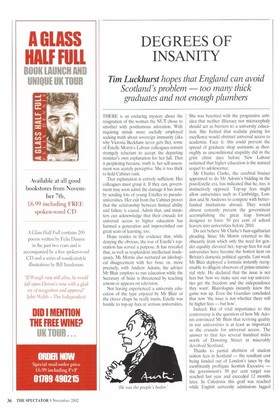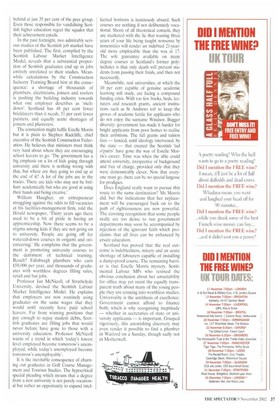DEGREES OF INSANITY
Tim Luckhurst hopes that England can avoid
Scotland's problem — too many thick graduates and not enough plumbers
THERE is an enduring mystery about the resignation of the woman the NUT chose to smother with posthumous adoration. With inquiring minds more usefully employed seeking truth about sovereign immunity (aka why Victoria Beckham never gets flu), some of Estelle Morris's Labour colleagues remain strangely reluctant to accept the departing minister's own explanation for her fall. That is perplexing because, truth is, her self-assessment was acutely perceptive. She is too thick to hold Cabinet rank.
That explanation is entirely sufficient. Her colleagues must grasp it. If they can, government may soon admit the damage it has done by sending lots of young Estelles to pseudouniversities. Her exit from the Cabinet proves that the relationship between limited ability and failure is causal. Admit that, and ministers can acknowledge that their crusade for universal access to higher education has harmed a generation and impoverished our great seats of learning, too.
Hope resides in the evidence that, while denying the obvious, the war of Estelle's reputation has served a purpose. It has revealed that, as well as resplendent intellectual inadequacy, Ms Morris also nurtured an ideological disagreement with her boss; or, more precisely, with Andrew Adonis, the adviser Mr Blair employs to run education while the Secretary of State is threatened by teaching unions or appears on television.
Not having experienced a university education of the type enjoyed by Mr Blair or the clever chaps he really trusts, Estelle was hostile to top-up fees at serious universities. She was besotted with the progressive antiidea that neither illiteracy nor microcephaly should act as barriers to a university education. She fretted that realistic pricing for excellence would obstruct universal access to academia. Face it: this could prevent the spread of graduate shop assistants as thoroughly as unconditional stupidity did in the grim elitist days before New Labour ordained that higher education is the natural sequel to adolescence.
Mr Charles Clarke, the cerebral bruiser appointed to do Mr Adonis's bidding in the post-Estelle era, has indicated that he, too, is instinctively opposed. Top-up fees might allow universities such as Cambridge, London and St Andrews to compete with betterfunded institutions abroad. They would almost certainly prevent the government accomplishing the great leap forward designed to force 50 per cent of school leavers into universities before 2010.
Do not believe Mr Clarke's faux-egalitarian pleading. Since Ms Morris returned to the obscurity from which only the need for gender equality elevated her, top-up fees for real universities have become the hottest item on Britain's domestic political agenda. Last week Mr Blair deployed a formula instantly recognisable to diligent observers of prime-ministerial style. He declared that the issue is not fees but 'how we make sure our top universities get the freedom and the independence they want'. Blairologists instantly knew the game was up. Even the Guardian concluded that now 'the issue is not whether there will be higher fees — but how'.
Indeed. But of vital importance to this controversy is the question of how Mr Adonis convinced Mr Blair that reviving quality in our universities is at least as important as the crusade for universal access. The answer to that lies several hundred miles north of Downing Street in miserably devolved Scotland.
Thanks to partial abolition of student tuition fees in Scotland — the resultant cost being funded out of London's taxes by the exorbitantly profligate Scottish Executive — the government's 50 per cent target was reached last year and exceeded 12 months later. In Caledonia this grail was reached while English university admissions lagged behind at just 35 per cent of the peer group. Even those responsible for vandalising Scottish higher education regret the squalor that their achievement entails.
In the past fortnight, two admirably serious studies of the Scottish job market have been published. The first, compiled by the Scottish Labour Market Intelligence Model, reveals that a substantial proportion of Scottish graduates end up in jobs entirely unrelated to their studies. Meanwhile calculations by the Construction Industry Training Board hint at the consequence: a shortage of thousands of plumbers, electricians, joiners and roofers is pushing the building industry towards what one employer describes as 'meltdown'. Scotland has 48 per cent fewer bricklayers than it needs, 51 per cent fewer painters, and equally acute shortages of joiners and plasterers.
The connection might baffle Estelle Morris but it is plain to Stephen Radcliffe, chief executive of the Scottish Construction Federation. He believes that ministers must think very hard about where they are encouraging school leavers to go. The government has a big emphasis on a lot of kids going through university and there is nothing wrong with that, but where are they going to end up at the end of it? A lot of the jobs are in the trades. There are kids who may not be brilliant academically but who are good at using their hands and being creative.'
William Haughey, an entrepreneur struggling against the odds to fill vacancies at his facilities-management firm, told the Herald newspaper, 'Thirty years ago there used to be a bit of pride in having an apprenticeship. Now there seems to be a stigma among kids if they are not going on to university. People are going off for watered-down courses in origami and orienteering.' He complains that the government is promoting university courses to the detriment of technical training. Result? Edinburgh plumbers who earn £50.000 per year, and thousands of graduates with worthless degrees filling sales, retail and bar jobs.
Professor Ian McNicoll, of Strathclyde University, devised the Scottish Labour Market Intelligence Model. He explains that employers are now routinely using graduates on the same wages that they would until recently have paid school leavers. Far from winning positions that pay enough to repay student debts, Scottish graduates are filling jobs that would never before have gone to those with a university education. Professor McNicoll warns of a trend in which `today's lowest level employed become tomorrow's unemployed, while today's unemployed become tomorrow's unemployable'.
It is the inevitable consequence of churning out graduates in Golf Course Management and Tourism Studies. The hypocritical special pleading which moans that a degree from a new university is not purely vocational but rather an opportunity to expand intel
lectual horizons is luminously absurd. Such courses are nothing if not deliberately vocational. Shorn of all theoretical content, they are marketed with the lie that wasting three years of your life being taught nonsense by nonentities will render an indebted 21-yearold more employable than she was at 17. The sole guarantee available on many degree courses at Scotland's former polytechnics is that only death will prevent students from passing their finals, and then not necessarily.
Meanwhile, real universities, at which the 10 per cent capable of genuine academic learning still study, are facing a compound funding crisis. With too few books, beds, lecturers and research Qrants, ancient institutions such as St Andrews toil to keep the groves of academe fertile for applicants who do not enjoy the surname Windsor. Bugger diversity: government has made it harder for bright applicants from poor homes to realise their ambitions. The full grants and tuition fees — funded, until ideology intervened, by the state — that created the Scottish lad o'pairts' have gone the way of Estelle Morris's career. Time was when the able could attend university, irrespective of background and free of charge, provided only that they were demonstrably clever. Now that everyone must go, there can be no special largesse for prodigies.
Does England really want to pursue this route to the same destination? Ms Morris did, but the indications that her replacement will be encouraged back on to the path of righteousness are now powerful. The dawning recognition that some people really are too dense to run government departments may soon be accompanied by rejection of the ignorant faith which proclaims that all lives can be enhanced by ersatz education.
Scotland has proved that the real outcome is indebtedness, misery and an acute shortage of labourers capable of installing a damp-proof course. The remaining barrier is that Estelle Morris mystery. Sentimental Labour MPs who resisted the obvious conclusion about her unsuitability for office may yet resist the equally transparent truth about many of the young people they are conning into worthless studies. Universality is the antithesis of excellence. Government cannot afford to finance both, which is why recognising ineptitude — whether in secretaries of state or university applicants — is important. Grasped vigorously, this astonishing discovery may even render it possible to find a plumber in Watford on a Sunday, though sadly not in Motherwell.



















































































































 Previous page
Previous page